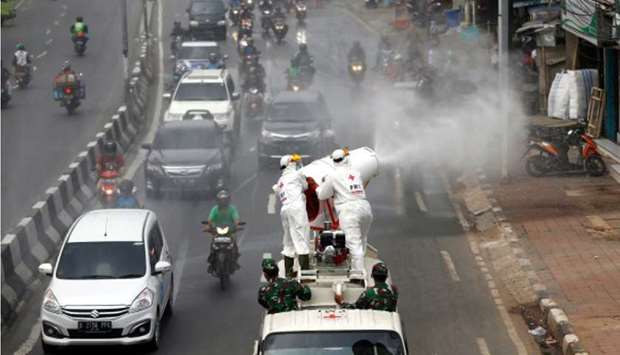Doctors, politicians and human rights commissioners are calling on Indonesia’s government to enact tighter movement restrictions as the death toll from coronavirus rose yesterday in the world’s fourth most populous country, which has resisted lockdowns.
A government minister in the country of 260mn said on Friday that a regulation was being prepared so regions can limit movement to stop the spread of the disease, which has killed 114 people in Indonesia as of yesterday, with 1,285 confirmed cases.
But he did not say when the legislation would be ready or how far it would go.
A hashtag that translates as #LockdownOrDie was trending on social media at the weekend, while human rights groups and medical professionals all joined calls for rapid action.
A spokesman for President Joko Widodo did not respond immediately to a request for comment on the demands for movement restrictions.
“There are a lot of people who have called on the central government to put in place a lockdown policy, especially in epicentres,” said Halik Malik, a spokesman of the Indonesian Doctors Association.
He said the association would support whatever approach is taken by Widodo, who has encouraged social distancing but questioned whether Indonesians have the culture or discipline for
lockdowns.
That has marked Indonesia out from Southeast Asian countries that have enacted restrictions, such as the Philippines, Malaysia and Thailand.
China, where the coronavirus originated, placed some 500mn people under restrictions at one point. India has ordered a total lockdown of its more than 1.3bn people.
Indonesia’s National Commission on Human Rights, a government body, called for a regional quarantine on areas that have been categorised as “red zones.”
The University of Indonesia’s Faculty of Medicine called in a letter for more “local lockdowns”. Arsul Sani, vice chairman of the upper house of parliament, said it was ready to support “regional quarantine” measures.
One major concern is whether the virus will spread during the “mudik” – when millions of Indonesians traditionally leave cities for their hometowns at the end of the Muslim fasting month of Ramadan in May.
The Indonesian capital Jakarta ordered a state of emergency on March 20, closing schools and entertainment spots. The city of Tegal, which like Jakarta is on the densely populated island of Java, said it would impose some restrictions from Monday.
The eastern province of Papua closed airports, sea ports and land borders on Thursday, but was ordered to reopen them by the central government.

Red Cross personnel wearing protective suits spray disinfectant on the road to prevent the spread of the coronavirus disease (Covid -19) in Jakarta yesterday.
